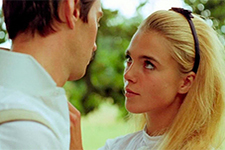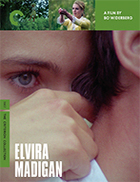Elvira Madigan
|  Following his first four films—the dour, black-and-white social realist works The Baby Carriage (Barnvagnen, 1963) and Raven’s End (Kvarteret Korpen, 1963), the self-reflexive Love 65 (Kärlek 65, 1965), and the workplace comedy Heja Roland! (1966)—one could not imagine a more unexpected film from Bo Widerberg than Elvira Madigan, a lush, period tragic romance shot in color. Based on the real-life story of the doomed relationship between Elvira Madigan, a young circus performer, and Sixten Sparre, a nobleman and lieutenant in the Swedish army, who ran away together in the late 1880s end ending up dying in a murder-suicide, it is in many ways a conventional period piece. Yet, Widerberg deviates from many of the traditions of the period romance, particularly in the loose narrative and intense emphasis on real locations and natural lighting, all of which presage the films of Terrence Malick, particularly Days of Heaven (1978). It is also clear that Widerberg has not abandoned his interest in social reality, as much of the tragedy around Elvira and Sixten hinges on their being from different social classes, which necessitates their cutting themselves off from the rest of society. This self-created isolation affords them an idyllic romance apart from the pressures of the world, albeit one that is inherently doomed to collapse. The story had been made into a previous film in 1943 by actor/director Åke Ohberg (who also played the role of Sixten, although the name was changed to Christian under pressure from Sixten’s family). Widerberg takes a substantially different narrative approach by eliding the development of Elvira and Sixten’s relationship and instead focusing entirely on the last few weeks of their lives, when they were already together and trying to forge a secret life for themselves. The story begins in a Danish forest, where the lovers spend much of their time, the beauty of the surrounding nature endowing their romance with an air of grace and sanctity that the rest of the world, especially the newspapers, which are hungry for a story, could only tarnish. Widerberg could begin this deep into the story because it was already so well known throughout Scandinavia, especially as it had been immortalized in Johan Lindström Saxon’s 1889 song “Sad Things Happen.” Yet, even without knowing the real-life story, one can easily follow the narrative, as there are constant references to the past that help us piece together what has happened (although some scenes will play very differently to those not in the know, including the opening where a young child finds Elvira and Sixten in the forest where they appear to be dead, but turns out they were only sleeping). Elvira was played by Pia Degermark, who was only 18 at the time and had never acted in a film. Degermark was a natural beauty who could hold the camera with a simple gaze, and although she won the Best Actress award at the Cannes Film Festival, her career stumbled through the next decade due to health battles with anorexia, a bad marriage to a controlling producer, and eventually drug problems and criminal charges involving embezzlement. Sixten was played by Tommy Berggren, who had had roles in all four of Widerberg’s previous features (including the lead in Raven’s End) and would go on to star in three more. With a face and left-of-center air reminiscent of French New Wave icon Jean-Paul Belmondo, Berggren makes for an intriguing romantic hero, though his version of Sixten is a highly romanticized fabrication given that the real Sixten likely suffered from severe mental illness. There is some attention paid to the fact that Sixten left a wife and two children to be with Elvira, but it is largely glossed over. Of course, historical veracity is not the point here, and Widerberg succeeds magnificently in weaving an air of languid, poetic romanticism that is nevertheless punctuated at times with bits of harsh reality (such as when Elvira makes herself physically ill eating wild berries). The majority of the soundtrack is supplied by the second movement from Mozart’s Piano Concerto No. 21 in C major, which became so associated with the film that it has since been referred to as the “Elvira Madigan Concerto.” The cinematography by Jörgen Persson is striking in its evocation of Impressionist painting, especially given that it was only his second feature film and his first time working in color (he would go on to a prolific career, shooting several more of Widerberg’s films and eventually working with Lasse Hallström and Bille August). The film’s colors are intense, bordering on Technicolor luminosity, while the image has a slightly soft, hazy texture that makes much of the film feel like a dream.
Copyright © 2023 James Kendrick Thoughts? E-mail James Kendrick All images copyright © The Criterion Collection | |||||||||||||||||||||||||||||
Overall Rating: 


 (3.5)
(3.5)


 This four-disc Blu-ray set contains four films: The Baby Carriage (1963), Raven’s End (1963), Elvira Madigan (1967), and Ädalen 31 (1969).
This four-disc Blu-ray set contains four films: The Baby Carriage (1963), Raven’s End (1963), Elvira Madigan (1967), and Ädalen 31 (1969).